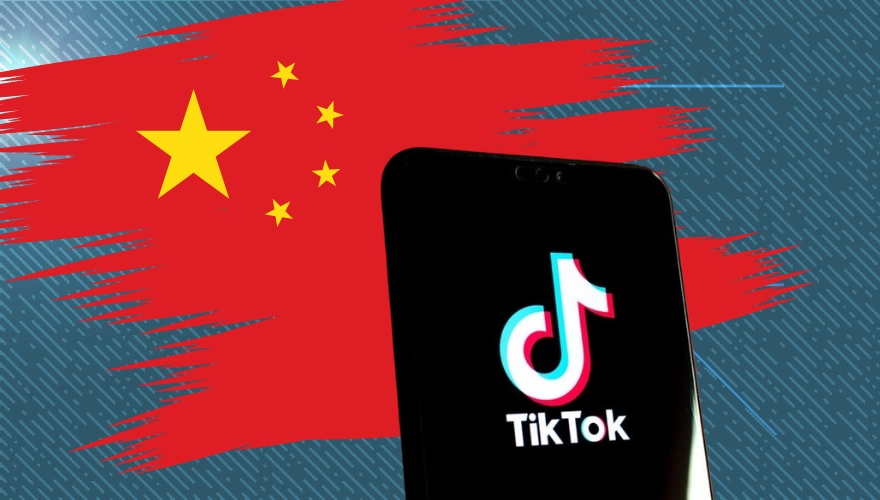The American Civil Liberties Union has sent a letter to members of Congress opposing HR 1153, a bill introduced by House Foreign Affairs Committee Chairman Michael McCaul, that would effectively ban TikTok in the United States.
The social media platform’s parent company, ByteDance, has ties to the Chinese Communist Party.
Introduced by House Foreign Affairs Committee Chairman Michael McCaul on Friday, HR 1153 would revise legal protections that have shielded TikTok from US sanctions and prohibit Americans from engaging with entities that may transfer sensitive personal data to a foreign entity “subject to the influence of China.”
The ACLU argued that the legislation would violate “the First Amendment rights of millions of Americans who use the app to communicate and express themselves daily.”
“Congress must not censor entire platforms and strip Americans of their constitutional right to freedom of speech and expression. Whether we’re discussing the news of the day, live streaming protests, or even watching cat videos, we have a right to use TikTok and other platforms to exchange our thoughts, ideas, and opinions with people around the country and around the world,” said Jenna Leventoff, senior policy counsel at ACLU.
In a letter to the House Foreign Affairs Committees on Monday, the ACLU said that “in a purported attempt to protect the data of U.S. persons from Chinese government acquisition, this legislation will instead limit Americans’ political discussion, artistic expression, free exchange of ideas — and even prevent people from posting cute animal videos and memes.”
“This legislation would also create an exception to the historic and invaluable Berman Amendment, which — for the past 35 years — has removed the president’s authority to regulate or ban the import or export of ‘informational materials, including but not limited to, publications, films, posters, phonograph records, photographs artworks, and news wire feeds’ and later electronic media,” the letter continued. “Congress enacted the Berman Amendment because it was concerned about how the International Emergency Economic Powers Act (IEEPA), which enables the president to impose sanctions on trade with hostile nations, could impact American access to works that would be protected if created in the United States, no matter where that speech originated. This bill’s exemption creates a slippery slope for further carve outs of the Berman Amendment that could erode its protections, and leave U.S. residents without some of their favorite international books, movies, and artwork.”
Former President Donald Trump had attempted to ban TikTok while he was in office in 2020 but was blocked. Many politicians, including Democrats, have now said he was correct.
Democrat Sen. Mark Warner, who chairs the Senate Intelligence Committee, admitted Trump was right during a November appearance on Fox News Sunday.
The senator told host Shannon Bream, “as painful as it is for me to say, if Donald Trump was right and we could’ve taken action then, that’d have been a heckuva lot easier than trying to take action in November of 2022.”
Virginia Democrat Sen. Mark Warner on TikTok: “I think Donald Trump was right. TikTok is an enormous threat.” pic.twitter.com/8g2fRwxrF7
— RNC Research (@RNCResearch) November 20, 2022
“Did Washington simply not listen because they didn’t like the messenger then and what can we do now?” Bream asked.
“Well, I think Donald Trump was right,” Warner said. “I mean, TikTok is an enormous threat.”
Warner explained that TikTok is “a massive collector of information,” including from children.
“So if you’re a parent and you got a kid on TikTok, I would be very, very concerned,” Warner said. “All of that data that your child is inputting and receiving is being stored somewhere in Beijing.”
Last year, the commissioner of the Federal Communications Commission urged Apple and Google to remove TikTok from their app stores over an “unacceptable national security risk.” In a letter on June 24, he wrote to Apple Inc. CEO Tim Cook and Alphabet Inc. and Google LLC CEO Sundar Pichai about how the app is a “sophisticated surveillance tool.”
“TikTok is not what it appears to be on the surface. It is not just an app for sharing funning videos or memes. That’s the sheep’s clothing,” Carr asserted in the letter. “At its core, TikTok functions as a sophisticated surveillance tool that harvests extensive amounts of personal and sensitive data.”
TikTok doesn’t just see its users dance videos.
It collects search and browsing histories, keystroke patterns, biometric identifiers, draft messages and metadata, plus it has collected the text, images, and videos that are stored on a device’s clipboard. pic.twitter.com/GKheArMM5X
— Brendan Carr (@BrendanCarrFCC) June 28, 2022
In a Twitter thread explaining the reason for his request, Carr wrote, “TikTok doesn’t just see its users dance videos. It collects search and browsing histories, keystroke patterns, biometric identifiers, draft messages and metadata, plus it has collected the text, images, and videos that are stored on a device’s clipboard.”
Numerous provisions of Apple’s & Google’s policies are relevant to TikTok’s pattern of surreptitious data harvesting—a pattern that runs contrary to its public representations.
And there’s plenty of precedent for holding TikTok accountable by booting it from these app stores. pic.twitter.com/QH1w4ERDdb
— Brendan Carr (@BrendanCarrFCC) June 29, 2022
“Tiktok’s pattern of misrepresentations coupled with its ownership by an entity beholden to the CCP has resulted in U.S. military branches and national security agencies banning it from government devices,” Carr continued. “Bipartisan leaders in both the Senate and House have flagged concerns.”

